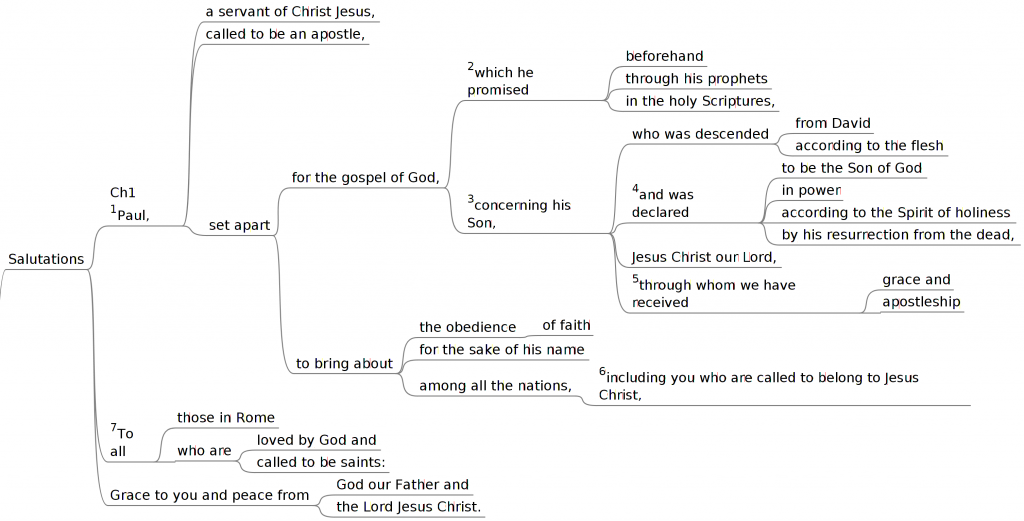Introductions are somewhat like genealogies to many of us; we have a tendency to just blow them off, and skip to “the good stuff”. But this introduction has plenty of Good stuff in it. It introduces Paul, the Gospel, Jesus, and the Christian, all of which are very relevant to us today, and which will be relevant as we go through the rest of this book.
Paul is a servant, yet also an apostle. How is one sent in authority also a servant? Yet this reflects Jesus’ teaching in Mark 10:42-45 (ESV):
And Jesus called them to him and said to them, “You know that those who are considered rulers of the Gentiles lord it over them, and their great ones exercise authority over them.43But it shall not be so among you. But whoever would be great among you must be your servantd, 44and whoever would be first among you must be slavee of all. 45For even the Son of Man came not to be served but to serve, and to give his life as a ransom for many.”
Paul is also set apart for the Gospel, to the end of the “obedience of faith”. Interesting that those who are in Rome (v7) are “called to be saints”; holiness is also essentially being set apart. So the one is set apart to preach the gospel, and the others are set apart to live it.
These verses also pack in a lot about Jesus, the point of the Gospel (and of everything else, truth be told). Jesus in the gospel fulfills promises made by men who spoke for God, whose words were written down and kept for us to read.
The gospel is about Jesus, the Son of God (putting together vv1-3: the gospel of God, which [God] promised beforehand … concerning his Son), but it is also about Jesus the Son of David (v3). But He is also Jesus, the Son of God in power… by his resurrection (v4), and finally, Jesus is the source of both grace and apostleship (v5).
This last one I find interesting, given the bilateral nature of lordship. That is, a Lord and a subject have a two way relationship, the one providing protection and other resources necessary for life, and the other providing service and fealty. In the same way, Jesus provides us Grace, which we need for (eternal and any other) life, but he also gives us a job, to represent him before a fallen world.
Rephrasing the above, in five short verses we see Jesus as the eternal Son of God, the human Son of Man, the glorified Son of God, and the Son our Lord.
These verses also talk about what it means to be a Christian. That is, the purpose of the Gospel is to bring about the obedience of faith (v5), and that purpose is to be fulfilled in the readers (v6). Some have argued about the meaning of “obedience of faith”, given the linguistic ambiguity of the construction. Does it mean that faith is obedience? or that obedience that comes from faith (e.g., NIV)? Or obedience that is in some other way characterized by faith? My understanding of the construction is that it doesn’t require or exclude any of these, and that we must interpret it from the larger context.
Why is this question important? One conversation I had recently asked whether Paul here is talking about a single act of faith, which produces justification (as will be treated at length later in Romans), which is thus itself obedience, but not intrinsically tied to any other obedience? Or is Paul talking about obedience that flows from faith, i.e., sanctification, the act of Christians being made more holy subsequent to their trusting Jesus. And most critically, is it possible to have the one and not the other? Is it possible to trust Jesus, then never produce any concrete life change?
I have heard this question debated ad nauseum, and I think it is important for scholars to wrestle with it, but I think here it is enough to say that even if it is possible to have faith without obedience, that would in no way be a good thing, and that in no way is the point of the Gospel. That is, for Paul (and I hope for us), we want to see lives changed because people trust Jesus (and thereby have a right relationship with God, and go to heaven, etc), but we also want to see lives changed here and now as people live more rightly (and thereby glorify God more in their bodies, here and now). If you’re promoting either one without the other, you’re cheating people, IMHO. And perhaps this is why Paul used an ambiguous phrase here. Perhaps the Gospel is there to make people obey by placing their faith in Jesus. Perhaps it is also there to make people more like Jesus, once they have placed their faith in him, and tasted and seen how good he is.
And this is affirmed in Paul’s description of hearers in v7: loved by God and called to be saints. We are not just loved, we are called to be holy. And we are not just called to be holy, but we are loved. This is a package deal, and we get it all in Jesus.
I was somewhat surprised to hear called to be saints this morning used in reference to unbelievers. I’m not sure if Paul meant it that way. But it does make sense, given that those whom he predestined he also called (8:30) is a part of the golden chain that predates conversion, and given that this predestination happened before the foundation of the world (Rev 13:8 & 17:8). So while we who believe are called to be holy, it stands to reason that there are some who have not yet converted, but who are nonetheless also loved by God and called to be holy. If so, how does God show this love? And how does he call them to be holy? Paul tells us his thoughts on this in ch 10:
How then will they call on him in whom they have not believed? And how are they to believe in him of whom they have never heard?c And how are they to hear without someone preaching? 15And how are they to preach unless they are sent? As it is written, “How beautiful are the feet of those who preach the good news!”
So we share the Gospel, and that calls people out of darkness into the kingdom of Light, and it shows people the love of God, as they hear what meets their greatest need.
And this is why grace and peace (v7) are distinctively Christian greetings. We proclaim grace to one another, because we know that it is by grace that we live and breathe. And we proclaim peace to one another, because this is what God has accomplished for us. And this is not just the sit-down-and-rest-awhile peace of a half time show; it is the complete fulfillment of all our needs in Jesus. It is peace with ourselves and peace with others because we have peace with the creator and sustainer of the universe –and everything else is secondary.


